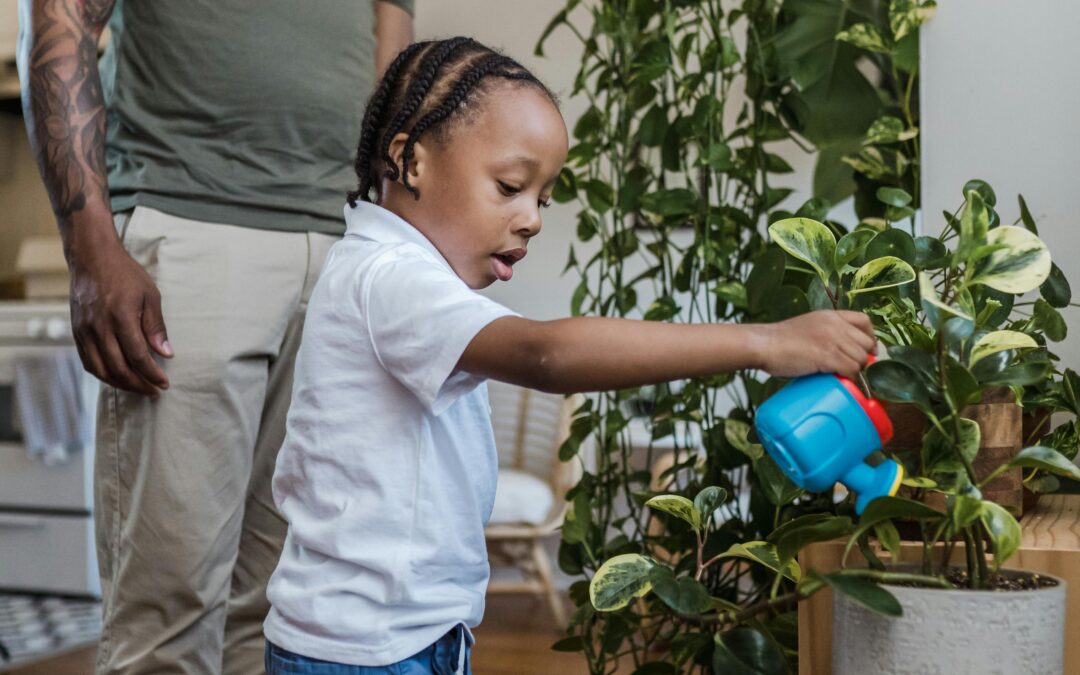Maria Montessori said, “Never help a child with a task at which he feels he can succeed.”
While it may seem counterintuitive to say so, often times when we as adults “help” the child, we are actually robbing him of the opportunity to grow. Real growth comes from real experience, not simply watching someone else do something. I cannot learn to tie my own shoes by simply watching you tie yours.
In the Montessori environment, children are given the opportunity for real life experiences on a daily basis to practice the skills they need to develop independence. In fact, there is an entire component of the Montessori curriculum devoted to the acquisition of these specific skill sets called “Practical Life”. The purpose of the Practical Life materials and exercises is to help the child develop a sense of order, coordination, concentration, and independence. In this area of the classroom, children have many open-ended activities available to them throughout the day. These activities would include: pouring grains of rice or water from one vessel to another, using tongs/tweezers/spoon to transfer a wet or dry medium from one dish to another, folding socks, using clothes pins, stringing beads, even sewing! There are wooden frames that allow a child to practice using a zipper, fastening buckles/snaps/Velcro, buttoning traditional buttons and tying shoelaces. One of my favorite components of the Practical Life curriculum is that the child may repeat the activity as long as he has the desire to do so. The ability to have open-ended practice is why Montessori children achieve independence so quickly.
The children then get to practice these skills in the “real world” of the classroom by: serving themselves snack (pouring juice or milk and using tongs or a spoon to serve the food portion), putting on their own jackets and zipping them up, putting on their own socks and shoes after napping, and folding up their nap bedding. Because the Montessori environment operates at “child speed” vs. “adult speed”, a child can spend 20 minutes putting on his shoes without being rushed or having an adult swoop in and complete the task for him. The satisfaction a child gets from mastering a new skill is priceless!
“Any child who is self-sufficient, who can tie his shoes, dress or undress himself, reflects in his joy and sense of achievement the image of human dignity, which is derived from a sense of independence.” – Maria Montessori
In addition to directly preparing the child to care for some of his own needs, the Practical Life materials indirectly help prepare the child for his academic journey in the Montessori classroom. The hand strength and coordination that the child gains from manipulating the tools in the Practical Life activities prepare him for the job of holding a pencil. The concentration, control and sense of order needed to complete the Practical Life exercises help prepare him to use more complicated and time consuming Montessori apparatuses in other curriculum areas of the classroom. The independence the child gains from successfully completing the Practical Life activities gives him the confidence to attempt more challenging work.
If you would like to incorporate some Practical Life activities into your home life, here are some suggestions:
Dry rice or water to pour from one small cup to another
Dry pasta, two bowls and a small spoon as a transfer activity (the child using the spoon or his hand to move the pasta from one bowl to the other)
Tongs to pick up pom-poms or small dry beans to move from one vessel to another
A rolling pin and play dough (or real dough) with cookie cutters
A small basket with clothespins so the child can clip the pins around the edge of the basket
A dishwashing sink or basin with soap, a sponge or scrub brush
A basket of loose socks for the child to sort and fold
A small washbasin, soap and brush with objects to be scrubbed (sea shells, or the child’s own toys work well)
It is important to remember that these activities will not be spill proof or mess free! Include a small broom, dustbin, and mop or towels in your at-home Practical Life activity zone. Cleaning up after oneself is also part of the Practical Life curriculum! In fact, children quite enjoy sweeping and cleaning, and can often be found doing so in the Montessori environment. Enjoy watching your child gain independence and confidence through the practice and repetition of these activities.

